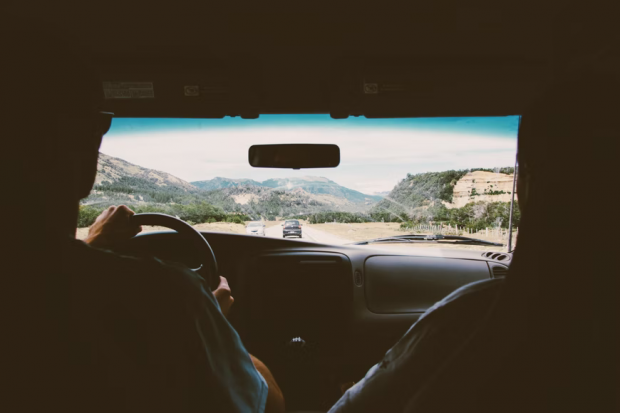
(Photo: How to Keep Yourself Safe on Long Road Trips)
Many people prefer the option of driving to flying when traveling long distances. Though the journey takes longer, there are many benefits to road-tripping to your destination rather than air travel, such as more freedom and flexibility. While the comfort of traveling on your own time is a nice benefit, long road trips are not without their potential problems.
There are many possible dangers on the road that can harm you while driving for an extended time. Many people report suffering from highway hypnosis - a phenomenon that causes you to lose focus of the road and essentially drive on autopilot - while driving long distances.
So how can you avoid highway hypnosis? And what other precautions can you take to keep yourself safe? Let's find out.
Avoid Driving While Fatigued
Fatigued driving has been compared many times to driving while under the influence. When you're tired, you're more likely to react more slowly, become distracted, and make dangerous decisions behind the wheel.
It's essential to avoid driving while fatigued to keep yourself safe on the road. There are some great ways to ensure you're not tired behind the wheel.
-
Drink some caffeine during your drive. It will help keep your energy levels higher.
-
Get enough sleep before leaving for your trip. Seven to nine hours is the average recommended amount.
-
Keep your car temperature cool to help you stay alert. Warm temperatures can cause you to feel drowsier.
-
Start earlier in the day to avoid driving at night. Night driving can decrease your energy levels and alertness.
-
Switch drivers and give yourself a break if someone traveling with you has a license.
It is hazardous to drive while fatigued. Tired driving can easily lead to highway hypnosis since your senses are dulled and reaction times are slower. All these factors have the potential to cause severe accidents and injuries.
If you want to stay safe while on the road, it's best to be well-rested before getting behind the wheel.
Make Sure Your Car and Coverage Are Prepared
Your road trip safety relies not only on your abilities behind the wheel but also on your car's reliability. This includes a number of factors like proper maintenance, a clean vehicle, and good insurance coverage in case you find yourself in an accident or your car breaks down.
Receive a Routine Maintenance Check
To keep your vehicle as safe as possible, make sure to have routine maintenance done before embarking on your journey.
If necessary, change the oil, ensure your tires are filled to the correct pressure, check your lights and blinkers, and make sure all fluids are full before leaving. This will help you avoid potential breakdowns in the middle of your route. You don't want to find yourself stranded on the side of the highway with car trouble.
Clean Out Your Vehicle
Cleaning your car before leaving for your trip may also be a good idea. If you have unnecessary items scattered throughout your car, take them out for your trip. This can help you stay organized while traveling. A disorganized vehicle can lead to possible distractions when searching for an item that seems to be lost.
Don't Forget to Check Your Insurance Coverage
Speaking with your insurance agent before you leave is also a good idea. It's important to know what type of coverage you have on your vehicle. Policy options like roadside assistance and comprehensive coverage are essential for road trips.
You'll want to see what your insurance covers and if there may be any add-ons you wish to include for your trip. Coverage won't change if you remain within the U.S., but you will want to mention to your agent if you plan to travel outside of the country, as this can cause policy complications.

Practice Safe and Defensive Driving Behind the Wheel
Although it's easy to become frustrated with other drivers - especially on extended trips - it's best not to let them affect you. The choices other motorists make are out of your control, which is why driving defensively while on your road trip is essential.
You should always plan for unexpected incidents, especially in heavy traffic. Staying alert and keeping your eyes on the road helps you do this. You should avoid potential distractions that take your eyes off the road, like cellphones or glancing at other passengers in the car. Losing focus can slow the reaction time you could have used to avoid an accident.
It's also best to throw assumptions about other drivers out the window. Although you can hope all the cars traveling near you have sober, law-abiding drivers behind the wheel, this may not be the case. It's likely motorists around you will not act the way you expect them to, so your driving should always be careful and calculated to account for other drivers.
Avoid using cruise control when there is traffic on the road. While giving your foot a break from your gas pedal may be convenient, it also takes your control away. Keeping in mind that other drivers will likely not act how you think they should, you could easily be cut off by another car. If your car is on cruise control, you may not have enough time to react, causing an accident.
Defensive driving is an essential part of keeping yourself safe on the road. You can't control what other people choose to do behind the wheel, but you can take every precaution to keep yourself and your passengers safe.
Safety Precautions for Extended Road Trips
Many people decide to drive rather than fly each year. Avoiding the headache of busy airports and not having to find transportation at your destination are excellent pros to road-tripping.
Driving to a destination is not without risk, however. Highway hypnosis, potential accidents, and possible breakdowns are all factors to consider and prepare for.
While these risks may seem concerning, there are some steps you can take to keep yourself safe behind the wheel. Avoiding driving while fatigued, making sure your car is well maintained, speaking to your insurance agent about your policy, and practicing defensive driving can help you protect yourself on the road.
Alexandra Arcand writes and researches for the auto insurance comparison site, AutoInsurance.org. Road trips are her preferred method of travel, and she enjoys sharing her tips to stay safe with others.
This article is copyrighted by Travelers Today, the travel news leader
* This is a contributed article and this content does not necessarily represent the views of travelerstoday.com



